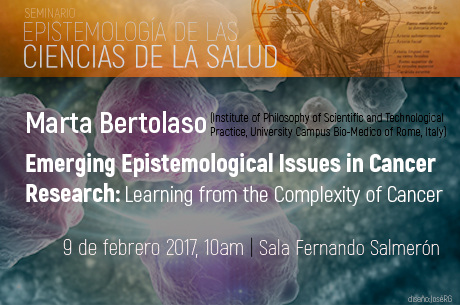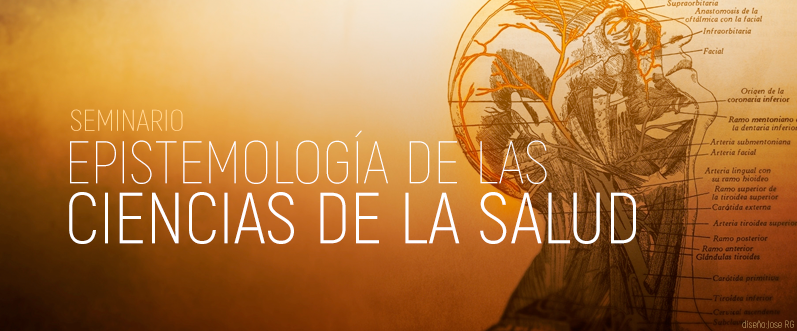|
Seminario Epistemología de las Ciencias de la Salud (SECS) - Semestre 2017-2 »»
El seminario sobre Epistemología de las Ciencias de la Salud (SECS) se inaugura en el semestre 2017-2 con una sesión inicial introductoria, siete sesiones del curso “Ciencia y Ética en los mercados farmacéuticos: Ensayos Clínicos y tráfico de enfermedades” a cargo de David Teira (UNED, Madrid) y una sesión especial sobre la Filosofía del Cáncer, a cargo de Marta Bertolaso (UNICAMPUS, Roma).
Coordina: Atocha Aliseda (IIF, UNAM)
Ciencia y ética en los mercados farmacéuticos. Ensayos clínicos y tráfico de enfermedades
La epistemología social de la ciencia se plantea de qué modo la organización de la investigación científica se corresponde con los objetivos de las sociedades que la financian y promueven. Un caso de particular interés para la epistemología social es el de los ensayos clínicos regulatorios: los experimentos mediante los que las agencias farmacéuticas comprueban la eficacia y seguridad de un medicamente antes de darle acceso al mercado. Por una parte, los filósofos de la ciencia han discutido, a lo largo de esta última década, la pretendida superioridad metodológica de estos ensayos respecto a otros tipos de evidencia clínica. Por otro lado, son muchos los críticos que denuncian que la industria farmacéutica financia los ensayos clínicos para sesgar sus conclusiones conforme a sus intereses. En este curso, estudiaremos los argumentos metodológicos y políticos que justifican cómo regulamos el acceso de medicamentos al mercado. Prestaremos particular atención a las condiciones que garantizan la imparcialidad de un experimento, y su significación epistemológica y social.
THE SCIENCE AND ETHICS OF PHARMACEUTICAL MARKETS: RANDOMIZED CLINICAL TRIALS AND DISEASE – MONGERING
Lecturer
Dr. David Teira Dpto. de Lógica, Historia y Filosofía de la ciencia | UNED (Madrid)
http://www.uned.es/personal/dteira/
Motivation and o verview
During the last two decades, there has been an upsurge in the social epistemology of science: to what extent the internal organization of scientific research is organized according to the political goals of the society hosting and sponsoring it? Regulatory experiments in pharmaceutical markets are a case in point: drugs are tested for safety and efficacy as a pre-requisite for commercial use. On the one hand, the epistemic standards of these tests have been seriously scrutinized and challenged by philosophers of science over the last decade. On the other hand, many critical voices of pharmaceutical capitalism in Europe and America have denounced that drug tests are rigged according to the private interests of the sponsors. In this course, we will examine the philosophy of scientific experimentation in practice, examining under what circumstances a test is both impartial (regarding the conflicts of interest at stake) and delivers truthful outcomes, according to its regulatory mission.
Audience
Graduate studen ts in philosophy/medicine interested in the following topics: philosophy of science (foundations of statistics, experiments, social epistemology); biomedical ethics and political philosophy (definition of disease, regulatory paternalism, patients’ choices)
Readings
-At the beginning of each session I will distribute a handout with a list of references. For a quick general introduction to the course’s topics, the student may use:
- Allan K. Hackshaw, A Concise Guide to Clinical Trials , London, Wiley & Sons, 2009
- Joseph Dumit, Drugs for life. How Pharmaceutical Companies Define Our Health, Durham & London, Duke University Press, 2012
CALENDARIO
Todas las sesiones serán los jueves de 9.00 a 12.00, con excepción de la sesión especial del 9 de febrero, que será de 10 a 12. Las sesiones tendrán lugar en dos sedes vecinas de Ciudad Univeristaria, el Instituto de Investigaciones Filosóficas (IIF) y la Dirección General de Divulgación de la Ciencia (DGDC).
|
|
Enero.26
|
Sesión inicial a cargo de Atocha Aliseda, “Sobre Afirmaciones Causales en la Práctica Clínica” (9 - 10.30am) y Alberto Campos, “Génesis y Consecuencias de Dilemas Bioéticos a partir de Controversias Científicas”, (10.30 - 12.00)
Lugar: IIF
|
|
Febrero.2
|
Session 1 | Overview [a] + The Statistical Foundations of RCTs [b]
Lugar: DGDC
Resumen
[a] I will introduce the centra problem of this course: to what extent can we organize biomedical research on purely scientific grounds? We will examine the use of randomized clinical trials (RCTs) as regulatory experiments, fostering the exchange between the different approaches invol ved in these problems: mostly, philosophy, history and sociology, with bits of economics and political science.
[b] The experimental design of randomized clinical trials originates in work of the statistician Ronald A. Fisher (on seeds and fertilizers) in the 1930s. The conclusions of the experiment are always probabilistic. We will see in this session three different epistemic interpretations of these conclusions: Fisherian p-values, Neyman-Pearson confidence intervals and Bayesian posterior probabilities. Most medical researchers conflate them, so we need a precise understanding of each approach in order to grasp what RCTs really conclude.
|
|
Febrero.9
|
 Sesión Especial: Sesión Especial:
"Emerging Epistemological Issues in Cancer Research: Learning from the Complexity of Cancer"
Prof. Marta Bertolaso (Institute of Philosophy of Scientific and Technological Practice Unive rsity Campus Bio-Medico of Rome, Italy)
Lugar: IIF
Resumen
It seems difficult to get a unified causal definition of cancer given the complex character of the disease both in its origin and onset. Different levels of the biological organization are, in fact, involved and causally relevant: from genes to tissue organizations and environmental factors. This poses interesting questions about current methodological and clinical approaches in cancer research, and questions the epistemological foundations of medicine when dealing with complex diseases. In this session I will discuss the role of epistemology for medicine through an analysis of the historical evolution of the experimental perspectives on cancer. In particular, I will focus on the heterogeneity of cancer and on its dynamic and processual character, discussing the explanatory import of different models of carcinogenesis. Is cancer complexity really irreducible? What does this would mean? What should be considered ‘fundamental’ in explanatory terms? What consequences for clinics and scientific practice should we draw from such complexity?
http://www.biotechnopractice.org/wordpress/marta-bertolaso/
http://www.springer.com/gp/book/9789402408638
|
|
Febrero.16
|
Session 2 | History and Sociology of RCTs
Lugar: DGDC
Resumen
The medical profession adopted RCTs as a method for drug testing in the 1950s, mostly in Britain and the US. Then in the 1960s RCTS became the regulatory standard for the American Food and Drug Administration. Historians and sociologists have analyzed this process following the guidelines of Ted Porter’s Trust in numbers: the clinical judgment of the individual expert was replaced the mechanical objectivity of a statistical method. In this session, we will discuss the assumptions of Porter’s model (what is indeed expert judgment in medicine?) re-examining some pioneer trials from the 1950s.
|
|
Febrero.23
|
Session 3 | The Philosophy of RCTs
Lugar : IIF
Resumen
As many of you probably know already, RCTs came under philosophical attack during the last decade thanks mostly to the work of John Worrall and Nancy Cartwright. Their objections hinge around two basic points: the statistical assumptions underlying RCTs ar e often unfulfilled; and, as a method of causal inference, they are far from conclusive. In this session we will examine in detail these objections and discuss how convincing they are.
|
|
Marzo.2
|
Session 4 | A Contractarian Approach to RCTs
Lugar: DGDC
Resumen
I will present here my own approach to RCTs as regulatory experiments. Every drug test faces a potential conflict of interests: the pharmaceutical industry wants quick access to the market; the patients want safe compounds; the physicians do not want to be sued for their prescriptions... So regulatory trials will decide on which drugs we use often against the interest of (some) of the contending parties. Why don’t they contest the conclusions of the trial and request a replication (or a different test)? Because, I contend, the design of RCTs is neutral regarding the conflicting interests at stake. I will try to account for this neutrality and why is it important from an epistemic standpoint.
|
|
Marzo.9
|
Session 5 | Are RCTs really impartial?
Lugar: IIF
Resumen
Several studies have been documenting that the conclusions of most published trials today support the interests of their sponsor, the pharmaceutical industry. Why is this happening? Are the pharmaceuticals cheating? I argue that these sponsor biases cannot be corrected with the standard debiasing procedures, since they go beyond the experiment and originate in the very research questions that trials should address. An analysis of disease-mongering will illustrate how trials can be perverted for marketing purposes.
|
|
Marzo.16
|
Session 6 | The normative foundations of regulatory RCTs
Lugar: DGDC
Resumen
RCTs have been used for regulatory purposes: since 1962, the American Food and Drug Administration requires two positive RCTs as proof of safety and efficacy before authorizing the introduction of new treatments in pharmaceutical markets. The use of RCTs for pre-market testing has been justified on paternalist grounds: RCTs constrain the choices of physicians in prescribing treatments to patients, establishing a minimal threshold of safety. We will examine the connection between RCTs and regulatory paternalism, discussing how recent legislation (the US 21 st Century Cures Act) relaxes paternalism with the introduction of new testing standards.
|
|
Marzo.23
|
Session 7 | Summary + An exe rcise
Lugar: IIF
Resumen
In the first half of this session, I will summarize what we have learnt so far about clinical trials and their philosophy. In the second half, we will examine a submitted paper on the topic, the objections of the referees and the author’s responses and final version, as a practical exercise in how to get published. with the introduction of new testing standards.
|
|
Portal, perfil y libro Prof. Bertolaso
http://www.biotechnopractice.org/wordpress/marta - bertolaso/
http://www.springer.com/gp/book/9789402408638
https://www.researchgate.net/profile/Marta_Bertolaso
Portal del Prof. Teira
http://portal.uned.es/portal/page?_pageid=93,707921&_dad=portal &_schema=PORTAL
Sedes
IIF: Sala Fernando Salmerón (Instituto de Investigaciones Filosóficas, Planta Baja).
http://www.filosoficas.unam.mx/sitio/ubicacion
DGDC: Teleaula Luis Estrada (Dirección General de Divulgación de la Ciencia, dentro del museo Universum , 3er piso, Edificio C).
http://www.universum.unam.mx/temp/temp_llegar.php
Inscripciones y mayores Informes
Atocha Aliseda (atochaa@gmail.com), 56227430.
|
|
|
|
|

